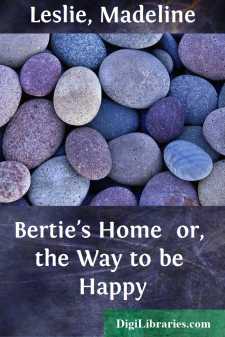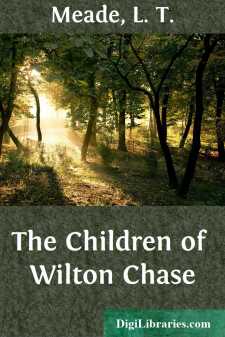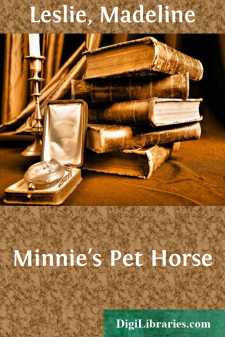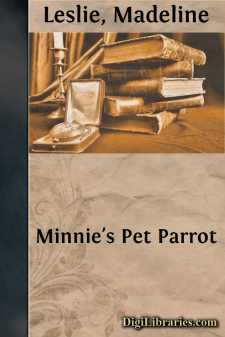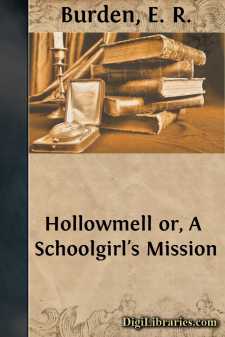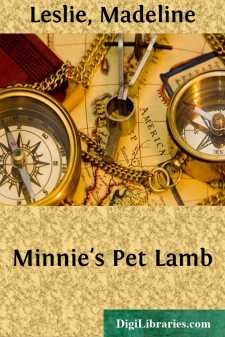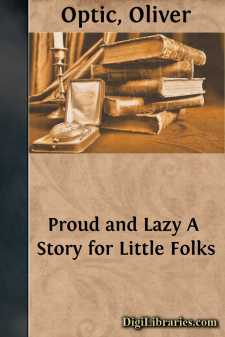Juvenile Fiction
- Action & Adventure 179
- Animals 188
- Biographical 1
- Boys / Men 133
- Classics 1
- Fairy Tales & Folklore 11
- Family 123
- General 262
- Girls & Women 187
- Historical 141
- Holidays & Celebrations 72
- Humorous Stories 2
- Imagination & Play 3
- Legends, Myths, & Fables 48
- Lifestyles 253
- Mysteries, Espionage, & Detective Stories 12
- Nature & the Natural World 3
- Religious 81
- School & Education 127
- Science Fiction, Fantasy, & Magic 12
- Short Stories 6
- Sports & Recreation 31
- Toys, Dolls, & Puppets 10
- Transportation 44
Juvenile Fiction Books
Sort by:
by:
Unknown
CHAPTER I. Elizabeth Adair was stooping to prop a rose-tree in a viranda, when she hastily turned to her sister, and exclaimed, “it is useless attending either to plants or flowers now: I must give up all my favourite pursuits.” “But you will have others to engage your attention,” returned Jane. “And will they afford me pleasure? You may as well say that I shall listen with joy to the foolish...
more...
by:
Madeline Leslie
THE RIDE. When I was a child I used to glance at the first sentence in a new book to see whether it looked interesting. If it began, "There was once a boy, who lived in a fine house," I was encouraged to go on. Now I wish to make these little books very interesting to my young readers. I want to have the words so simple that they can be read and not skipped over, and at the same time my object...
more...
by:
L. T. Meade
MARJORIE'S WAY. don't care," said Ermengarde. "I won't do it! I won't obey her!" "What are you saying, Ermie?" Ermengarde was standing by the dressing-table in her room. She had been talking half to herself; she now turned quickly round, and confronted a plain little girl of between eleven and twelve. "Is that you, Marjorie? I didn't know you were...
more...
CHAPTER I. Melody, My Dear Child:I SIT down to write my story for you, the life-story of old Rosin the Beau, your friend and true lover. Some day, not far distant now, my fiddle and I shall be laid away, in the quiet spot you know and love; and then (for you will miss me, Melody, well I know that!) this writing will be read to you, and you will hear my voice still, and will learn to know me better...
more...
by:
Anonymous
INTRODUCTION. It was the opinion of the wise Pythagoras, and of some other philosophers, that the souls of men, women, and children, after their death, are sent into other human bodies, and sometimes into those of beasts and birds, or even insects; and that they hereby change their residence either to their advantage or disadvantage, according to their good or ill behaviour in their preceding state of...
more...
by:
Madeline Leslie
CHAPTER I.THE HORSE AND THE DOG. In the other books of this little series, I have told you about Minnie’s pet parrot, her pet cat, and her pet dog. In this one, I shall give you an account of her pet pony, and also tell you anecdotes of other horses. Star was the name she gave her Shetland pony, I suppose because he had a white star on his forehead, which showed very distinctly from the contrast with...
more...
by:
Madeline Leslie
INTRODUCTION. The object of these little books is not so much to give full, scientific information with regard to the animals of which they treat, as to bring before the child such facts concerning them as shall interest him in their history, awaken a desire to know more of the particular traits of each, and especially lead him to be kind to them as a part of God’s creation. Natural history we deem,...
more...
by:
E. R. Burden
MINNIE'S PLAN. "Why, wherever can my books be?" exclaimed Minnie Kimberley in a vexed tone, as she hunted up and down the schoolroom, opening now one cupboard, then another, now a desk, and again diving down to peer under some out-of-the-way table or form; for places which one would think the most unlikely, were certain to be the places where Minnie's books would at length be...
more...
by:
Madeline Leslie
NANNIE AND THE PONY. In another book, about Minnie’s pet pony, I have already given you some account of Nannie, her pet lamb. This had all the peculiarities of the South Down, to which breed of sheep it belonged. It had full, bright, black eyes, a small head, and a brownish-gray face and legs. Its back was straight and wide, and covered with fine, short wool, which protected it from the cold. When...
more...
by:
Oliver Optic
PROUD AND LAZY. I. Tommy Woggs was a funny little boy. He was very proud and very lazy. He seemed to think he was a great man, and that other people lived only to serve and obey him. None of the boys and girls liked him, because he used to order them round, and because he thought himself so much better than they were. Tommy's father was a doctor, and a rich man. He could afford to have servants to...
more...



